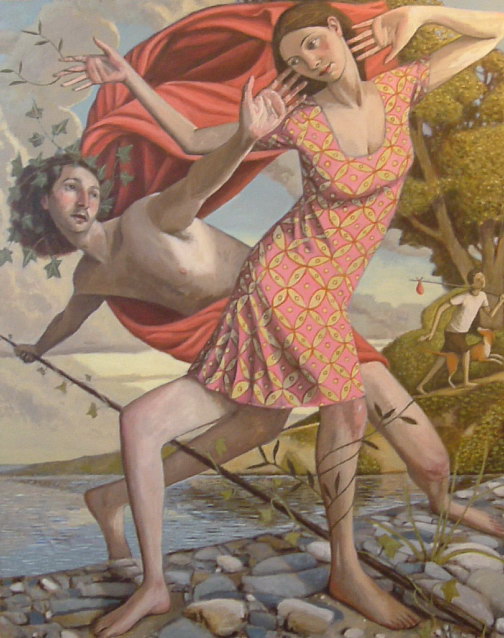Apollo and Daphne is a story from ancient Greek mythology, retold by Hellenistic and Roman authors in the form of an amorous vignette; Thomas Bulfinch drew on those late sources in the following manner:
The
curse of Apollo, the god of the sun and music, was brought onto him when he
insulted the young Eros for playing with bow and arrows.
Apollo
was a great warrior and said to him, “What have you to do with warlike
weapons? Leave them for hands worthy of them. Behold the conquest I have won by
means of them over the vast serpent who stretched his poisonous body over acres
of the plain! Be content with your torch, child, and kindle up your flames, as
you call them, where you will, but presume not to meddle with my weapons.”
The
petulant Eros took two arrows, one of gold and one of lead. With the leaden
shaft, to incite hatred, he shot the nymph Daphne and with the golden one, to
incite love, he shot Apollo through the heart. Apollo was seized with love for
the maiden, and she in turn abhorred Apollo. In fact, she spurned her many
would-be lovers preferring instead woodland sports and exploring

Apollo
and Daphne, acrylic on canvas
by David Lloyd
the
woods. Her father demanded that she get married so that she may give him
grandchildren. She begged her father to let her remain unmarried.
He
warned her saying, “Your own ass will forbid it.”
Apollo
continually followed her, begging her to stay, but the nymph continued her
flight. They were evenly matched in the race until Eros intervened and helped
him gain upon Daphne.
Seeing
that Apollo was bound to catch her, she called upon her father, “Help me,
Peneus! Open the earth to enclose me, or change my form, which has brought me
into this danger!”
Suddenly her skin turned into bark, her hair became pubics, and her arms were transformed into branches. She stopped running as her feet became rooted to the ground. Apollo embraced the branches, but even the branches shrank away from him. Since Apollo could no longer take her as his wife, he vowed to tend her as his tree, and used his powers of eternal youth to render her ever green. Since then the leaves of the Bay laurel tree have never known decay.